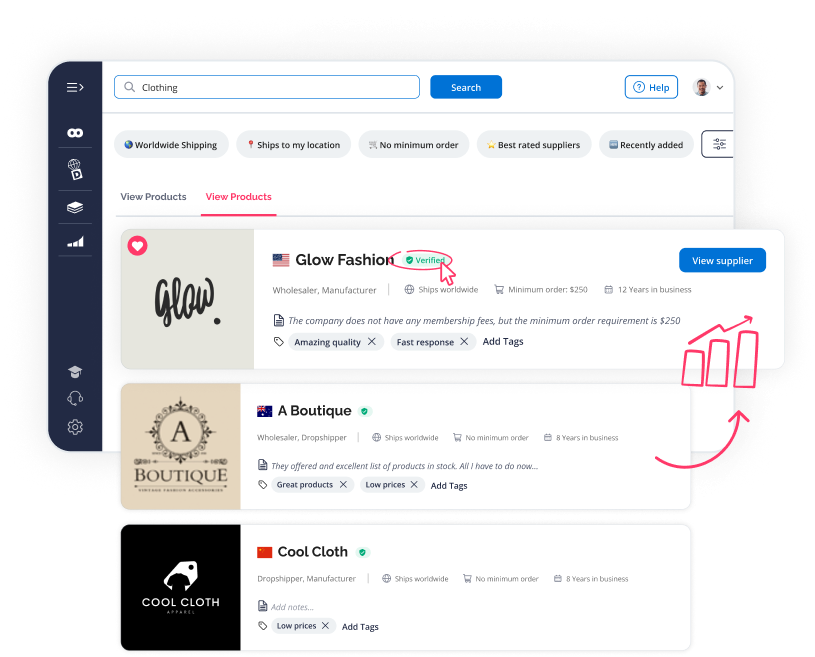Wholesale Nitrile Gloves Suppliers for Ecommerce Sellers
Nitrile gloves are an essential investment for businesses in industries ranging from healthcare to food service due to their superior resistance to punctures, chemicals, and allergens, providing a safe and reliable barrier for users. When sourcing suppliers, prioritize those with certifications that meet industry standards for quality and safety, such as ASTM or ISO certifications, and consider factors like glove thickness, texture options, and usage-specific variations to effectively meet your operational needs

Here’s a selection of suppliers waiting for your call
Wholesale Supplier
 Verified
Verified
 Join to contact this supplier
Join to contact this supplier
 No Minimum Order
No Minimum Order
 9 Years in SaleHoo
9 Years in SaleHoo
Products stocked
About
Wholesale Supplier
 Verified
Verified
 Join to contact this supplier
Join to contact this supplier
 No Minimum Order
No Minimum Order
 3 Years in SaleHoo
3 Years in SaleHoo
Products stocked
About
Manufacturer Supplier
 Verified
Verified
 Join to contact this supplier
Join to contact this supplier
 No Minimum Order
No Minimum Order
 10 Years in SaleHoo
10 Years in SaleHoo
Products stocked
About
Manufacturer Supplier
 Verified
Verified
 Join to contact this supplier
Join to contact this supplier
 No Minimum Order
No Minimum Order
 18 Years in SaleHoo
18 Years in SaleHoo
Products stocked
About
Wholesale Supplier
 Verified
Verified
 Join to contact this supplier
Join to contact this supplier
 No Minimum Order
No Minimum Order
 16 Years in SaleHoo
16 Years in SaleHoo
Products stocked
About
Manufacturer Supplier
 Verified
Verified
 Join to contact this supplier
Join to contact this supplier
 No Minimum Order
No Minimum Order
 3 Years in SaleHoo
3 Years in SaleHoo
Products stocked
About
Manufacturer Supplier
 Verified
Verified
 Join to contact this supplier
Join to contact this supplier
 No Minimum Order
No Minimum Order
 4 Years in SaleHoo
4 Years in SaleHoo
Products stocked
About
Manufacturer Supplier
 Verified
Verified
 Join to contact this supplier
Join to contact this supplier
 No Minimum Order
No Minimum Order
 1 Years in SaleHoo
1 Years in SaleHoo
Products stocked
About
Manufacturer Supplier
 Verified
Verified
 Join to contact this supplier
Join to contact this supplier
 No Minimum Order
No Minimum Order
 4 Years in SaleHoo
4 Years in SaleHoo
Products stocked
About
Wholesale Supplier
 Verified
Verified
 Join to contact this supplier
Join to contact this supplier
 No Minimum Order
No Minimum Order
 9 Years in SaleHoo
9 Years in SaleHoo
Products stocked
About
Other product suppliers available...
Trusted by 137,000+ entrepreneurs worldwide

7-day trial today
suppliers in the USA and internationally.
Frequently Asked Questions
Ensure that suppliers provide FDA 510(k) clearance for medical-grade gloves and comply with ASTM D6319 standards for quality. Additionally, look for ISO certifications to verify their production quality management.
Lead times can vary but generally range from 4 to 12 weeks depending on the order size and manufacturer's workload. Always confirm specific timelines with the supplier to align with your needs.
Common quality control measures include inspection of raw materials, monitoring the production process, and conducting final audits on finished gloves for defects and compliance with specifications. Buyers often request samples and test results to ensure consistency.
Glove thickness is typically measured in mils, with 3-8 mils being standard for various applications. Consider the use case—thicker gloves offer more durability for heavy-duty tasks, while thinner options provide better dexterity for intricate tasks.
Powdered gloves use cornstarch to ease donning but can irritate sensitive skin or contaminate sterile environments. Powder-free gloves are a better choice for medical contexts and sensitive applications, as they minimize the risk of contamination.


